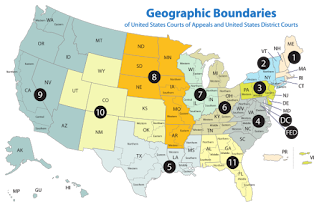In 2021 we'll be looking at interesting federal cases. To start things off, let's look at one from November 2020 in the United States Court of Appeals for the Eleventh circuit. Here's a map of the circuits.

The 11th circuit is Florida, Georgia, and Alabama.
This case is called Bilal v Geo Care, et al and is an appeal of a case from the District Court for the Middle District of Florida.
Plaintiff [Appellant] is listed as:
JAMAAL ALI BILAL,
f.k.a. John L. Burton,
a.k.a. Superman
Defendants are various state employees and/or contractors who were involved in transporting Plaintiff from the Florida Civil Commitment Center (“FCCC”) to Escambia County Courthouse in Pensacola, Florida, for a judge to determine whether Bilal was eligible for release from civil confinement.
Definition: Civil commitment or confinement is court-ordered treatment for persons who are mentally ill, chemically dependent, sexually dangerous, or other condition which generally renders them a danger to society because they are likely to commit future violent crimes. People who qualify are civilly committed after they have served their time for crime/s they have committed in the past.
In this case, Plaintiff Bilal had been deemed a "sexually violent predator". He was being transported approximately 600 miles from FCCC [in Arcadia Florida, which is more than half-way down Florida, between Orlando and Miami] to a court hearing in Pensacola Florida [all the way west on the panhandle, just a smidge from Alabama], for a judge to determine whether he was eligible for release from civil confinement. I googled this and it's estimated to be a 7.5-8 hour trip.
Bilal was transported by van, and to ensure he didn't escape and further endanger the public, Bilal claims that the transportation crew violated his civil rights by, among other things, (1) confining him in handcuffs, leg irons, and waist chains, which was cramped and aggravated his knee condition, requiring surgery, (2) feeding him only a bottle of water and two slices of cheese on two stale pieces of bread for the entire trip, which gave him food poisoning, (3) not allowing him any bathroom breaks, causing him to defecate in his prison jumpsuit and having to sit in his excrement for 300 miles.
Because they have "served their time" and are no longer being punished for past crimes, people who are civilly committed have more rights than those who are serving criminal sentences. As the court wrote, "We apply a balancing test to determine whether a State’s restraints on a civilly committed person violate that individual’s substantive-due-process rights."
Regarding the handcuffs, leg irons, waist chains, and single bottle of water and cheese sandwich, the court said it did "not conclude that those choices were so extreme and unreasonable as to amount to a violation of Bilal’s constitutional rights."
However, regarding the lack of bathroom breaks, the court said "an unreasonable refusal to allow a prisoner to use the restroom, which results in his being forced to sit in his own feces for an extended period, constitutes an Eighth Amendment violation [cruel and unusual punishment]."

Do you agree with the court's conclusion? Why or why not?







